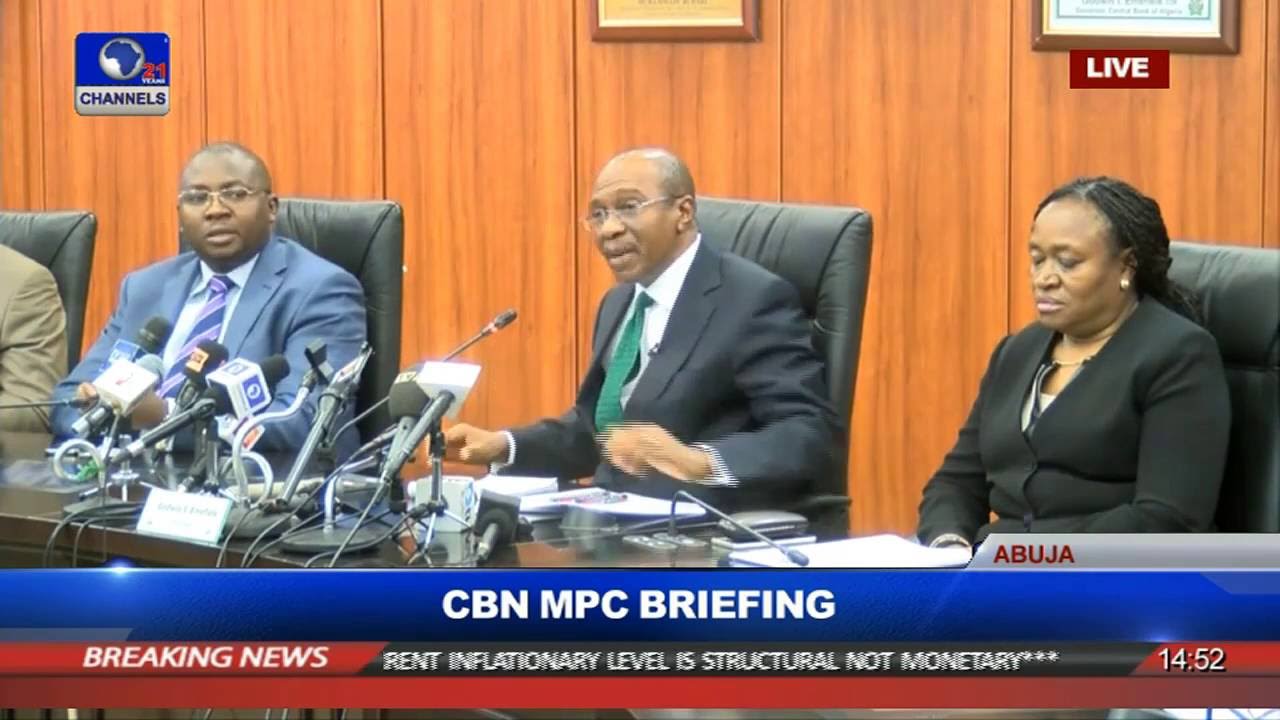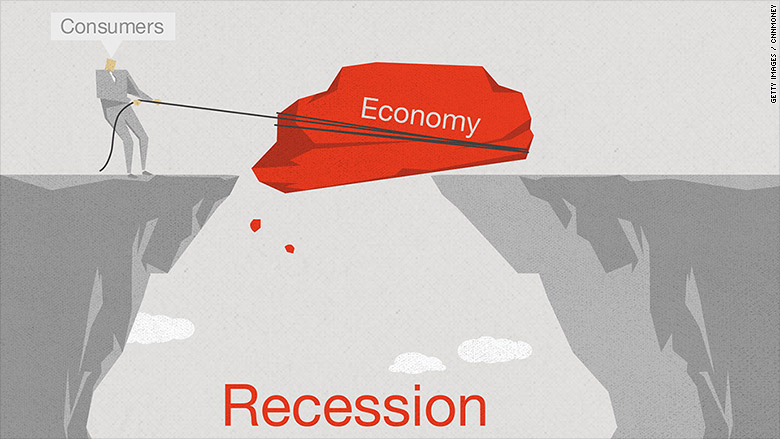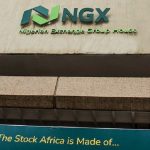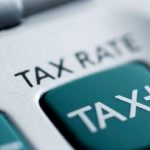Economy
Nigeria to Quit Recession 2017, Devalue Naira Again—FBNQuest Research
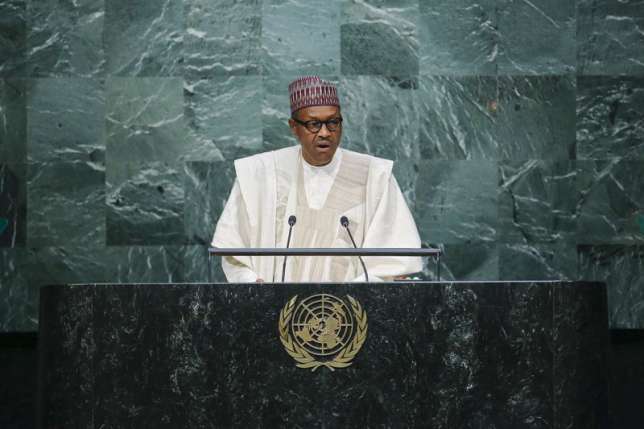
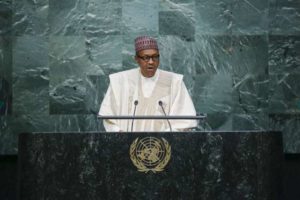
By Modupe Gbadeyanka
A research carried out by FBNQuest Research has predicted that Nigeria’s economy will leave recession this year and grow by 2 percent.
However, it pointed out that there would be another devaluation of the Naira in 2017.
In June 2016, the Central Bank of Nigeria (CBN) floated the Naira in a bid to give the local currency strength at the foreign exchange market. But this seems not to have worked because the Naira has lost over N150 against the Dollar since then.
At the moment, the Naira is N516 to $1 at the parallel market compared with about N342 it was sold in June 2016.
In the report titled ‘2017 Outlook So much to do; so little time,’ it was noted that the fiscal stimulus for this will be the main driver, supported by a recovery in oil production and selective private investment.
“Beyond our forecast horizon, household consumption will recover, leading to an acceleration in growth,” part of the report said.
According to FBNQuest Research, “The 2017 budget proposals are still more expansionary than the previous year’s, set a heady target for capital releases and maintain the level of personnel costs. If the FGN is able to hit its revenue targets and implement its proposals, we will see a sizeable fiscal stimulus. We could have the rare bonus of a relatively fast passage of the budget.”
It described the 2017 budget proposals as “ambitious”, noting that it contains aggregate spending of N7.30 trillion including unprecedented capital releases of N2.24 trillion, aggregate revenues of N4.94 trillion and a mouth-watering FGN deficit of N2.36 trillion.
The report identified these as “hefty increases on the 2016 budget and even larger increases on the likely outturn for 2016. “
It said one change for the better is that the FGN has produced more realistic projections for non-oil revenue collection, and assumed that the oil economy will generate more revenue than the non-oil.
“The fiscal expansion is the base of our GDP growth forecast of 2 percent for this year. We hear that we are being overly hopeful: we would reply that the population is said to be growing at 3.2 percent per year and that we are forecasting a decline in per head incomes.
“Our forecast is supported by selective private-sector investment (as in agriculture and petrochemicals) and by a pick-up in oil production.
“Our thinking is that the FGN has no choice but to reach a compromise to restore stability to the Niger Delta.
“It has said repeatedly that the diversification of the economy hinges ironically upon healthy oil revenues.
“Initially, it did not want to continue paying the allowances to militants in the delta but has reluctantly changed its position,” the report noted.
FBNQuest Research says it sees a rise in crude production including condensates to 2.10 mbpd this year from an estimated 1.82 mbpd. The FGN is assuming 2.20 mbpd in its proposals.
It said further that, “On the average oil price assumption of $44.50/b for this year, in contrast, the proposals are conservative.
“Our expectation is $57/b with some upside. The FGN therefore should have some welcome headroom, which it will value if production underperforms. Our thinking is based on hints from OPEC that, when it next meets in May, it may make further cuts in production quotas if it is not happy with the direction of the price.”
Also, the report observed that the “signals from the CBN, the MPC and the political leadership indicate otherwise but we think that there will be devaluation in Nigeria in 2017.”
It explained that, “While we cannot detect any changes in the official mindset on the exchange rate, we see another devaluation this year in the ‘last resort’ category. The CBN will struggle to resist the urge to manage the rate in some way.”
It pointed out that the economy has need of sizeable autonomous forex inflows to meet legitimate import demand, close the gap between the interbank and other forex markets, and create a market in which the CBN is not the dominant player.
The report argued that the monetary authorities are not equipped to counter both GDP contraction and rising inflation. Their task will be clearer when positive growth returns and inflation starts to slow on positive base effects.
It said, “The next rate moves by the MPC should be downwards, in line with (or perhaps anticipating) steady declines in headline inflation.”
Commenting on the stock market, the report said it expects the market to trade sideways for the most part until some clarity on the forex situation emerges.
“If a resolution leads to a free float regime (or very close to it), we expect a surge in capital inflows. Our base case scenario is a 10 percent rise in the ASI for 2017 based on our fair value forecasts. A resolution of the forex situation could lead to a gain of at least 20 percent.
“We see upside potential of up to 10 percent for the banks sector on average; a marked resumption of capital inflows from offshore portfolio investors could lead to a much stronger performance.
“We forecast the average ROAE for our universe of banks to move up to 18.3 percent in 2016E, thanks to forex-related gains, but subsequently fall sharply to 11.2 percent in 2017E (assuming forex-related gains are not material in 2017E).
“Among the non-financials, we prefer the cement and palm oil names for which we see upside potential of 56 percent and 6 percent respectively on average.
“The other sectors continue to struggle with the headwinds stemming from forex devaluation given their high dependence on imported raw materials and/or FCY loans.”
On the federal government’s bonds, the report said, “FGN bond yields are likely to drift higher before the policy rate cuts due to the fiscal expansion and substantial issuance programme.
“Active investors will prefer the better returns on longer tenor NTBs. After three years of consecutive losses, we expect equities to regain some lost ground this year. We forecast the ASI to return 10 percent, implying an end-year target of 29,560.”
Economy
NASD OTC Index Jumps to 3,830.31 Points on 1.68% Gain

By Adedapo Adesanya
The NASD Over-the-Counter (OTC) Securities Exchange extended its gains by 1.68 per cent on Tuesday, February 10, further lifting the Unlisted Security Index (NSI) by 63.37 points to 3,830.31 points from the previous session’s 3,766.94 points.
In the same vein, the market capitalisation of the bourse expanded by N37.92 billion during the session to N2.291 trillion from the N2.253 trillion it ended on Monday.
The growth was helped by six price gainers led by Central Securities Clearing System (CSCS), which gained N5.88 to sell at N64.73 per share versus N58.85 per share, FrieslandCampina Wamco Nigeria Plc rose by N3.67 to N69.67 per unit from N66.00 per unit, Afriland Properties Plc increased by 94 Kobo to N15.95 per share from N15.01 per share, Geo-Fluids Plc appreciated by 33 Kobo to N4.41 per unit from N4.08 per unit, IPWA Plc soared by 26 Kobo to N2.85 per share from N2.59 per share, and Food Concepts Plc improved by 26 Kobo to N2.89 per unit from N2.63 per unit.
Business Post reports that there were three price losers yesterday, led by MRS Oil, which lost N20.00 to trade at N180.00 per share versus N200.00 per share, NASD Plc dipped by N3.60 to N51.40 per unit from N55.00 per unit, and Air Liquide Plc depreciated by N2.21 to N20.32 per share from N22.53 per share.
The activity level was down on Tuesday, as the volume of securities slid 50.1 per cent to 6.9 million units from 13.3 million units, the value of securities decreased by 10.4 per cent to N89.1 million from N99.3 million, and the number of deals reduced by 2.1 per cent to 46 deals from 47 deals.
CSCS Plc was the most traded stock by value on a year-to-date basis, with 17.7 million units sold for N752.8 million, Geo-Fluids Plc recorded the sale of 29.2 million units valued at N149.8 million, and FrieslandCampina Wamco Nigeria Plc ended with a turnover of 1.8 million units worth N119.8 million.
The most traded stock by volume on a year-to-date basis was Geo-Fluids Plc with 29.2 million units exchanged for N149.8 million, followed by CSCS Plc with 17.7 million units traded for N752.8 million, and Mass Telecom Innovation Plc with 15.1 million units valued at N6.1 million.
Economy
Naira Soars to N1,351/$1 at Official Market, N1,430/$1 at Black Market
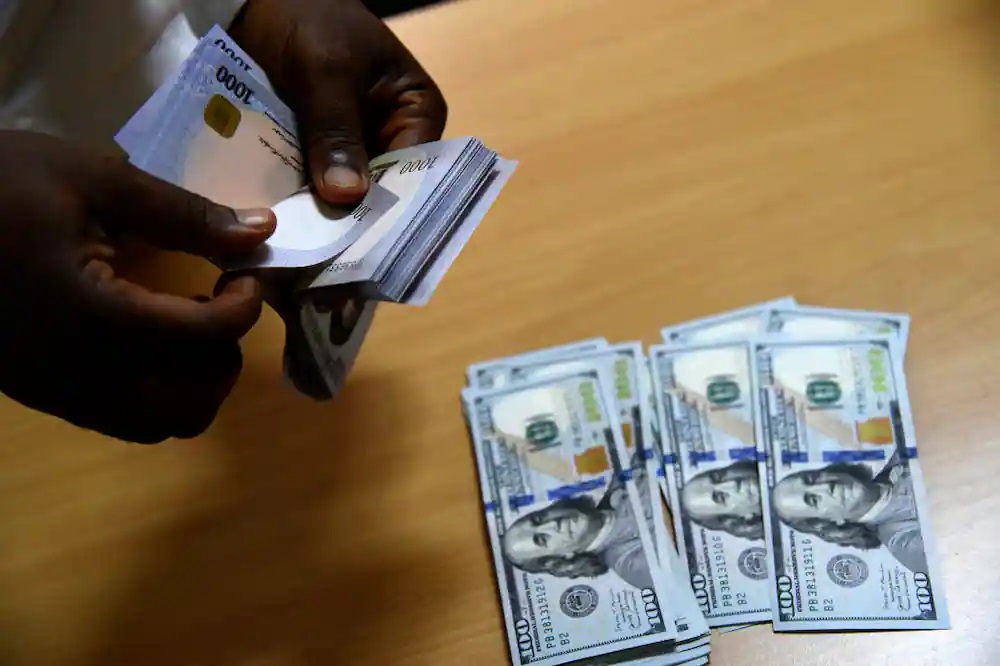
By Adedapo Adesanya
The consistent reform agenda of the Central Bank of Nigeria (CBN) aimed at enhancing market stability by improving foreign exchange (FX) liquidity further strengthened the Nigerian Naira against the US Dollar in the Nigerian Autonomous Foreign Exchange Market (NAFEX) on Tuesday, February 10, by N3.24 or 0.24 per cent to N1,351.02/$1 from the previous day’s N1,354.26/$1.
At the black market, the Naira gained N20 against the United States Dollar yesterday to trade at N1,430/$1 compared with the preceding day’s N1,450/$1, and at the GTBank FX desk, it improved its value by N16 to sell for N1,363/$1, in contrast to the N1,379/$1 it was exchanged a day earlier.
The domestic currency also appreciated against the Euro in the official market during the session by N6.70 to N1,606.49/€1 from the preceding session’s N1,613.19/€1 but depreciated against the Pound Sterling by 85 Kobo to close at N1,846.57/£1 compared with Monday’s closing price of N1,845.72/£1.
Nigeria’s FX market has continued the year on a firmer footing, extending the positive momentum recorded in 2025.
The Governor of the central bank, Mr Yemi Cardoso, said reforms have extended across the financial landscape, anchored on disinflation, FX market normalisation, and financial-system resilience, which are strengthening real-sector confidence.
In addition, stronger trade receipts, reflecting the impact of elevated global oil prices, helped boost FX supply and support currency stability.
Meanwhile, the cryptocurrency market was under pressure, with analysts saying the recent drawdown, which is the steepest since the 2024 halving, has come on low spot trading volumes, suggesting retail investors have mostly stepped aside while leveraged derivatives drive price moves.
This comes ahead of a closely-watched US employment data for January due on Wednesday, which the US government officials suggest could be weaker than forecast.
Originally scheduled for last Friday, the government’s January Nonfarm Payrolls Report is now coming out on Wednesday morning due to the brief federal shutdown last month.
Solana (SOL) weakened by 4.5 per cent to $81.91, Binance Coin (BNB) slumped 4.4 per cent to $608.22, Ripple (XRP) dipped 4.3 per cent to $1.37, Ethereum (ETH) dropped 3.7 per cent to $1,975.44, and Dogecoin (DOGE) saw a 3.2 per cent fall in value to trade at $0.0916.
Further, Bitcoin (BTC) went down by 2.8 per cent to $67,517.93, Cardano (ADA) slid 2.7 per cent to $0.2581, and Litecoin (LTC) declined by 2.1 per cent to $52.55, while the US Dollar Tether (USDT) and the US Dollar Coin (USDC) closed flat at $1.00 each.
Economy
NGX Records 2026 Highest Daily Gain of 1.65% as YtD Return Hits 13.62%
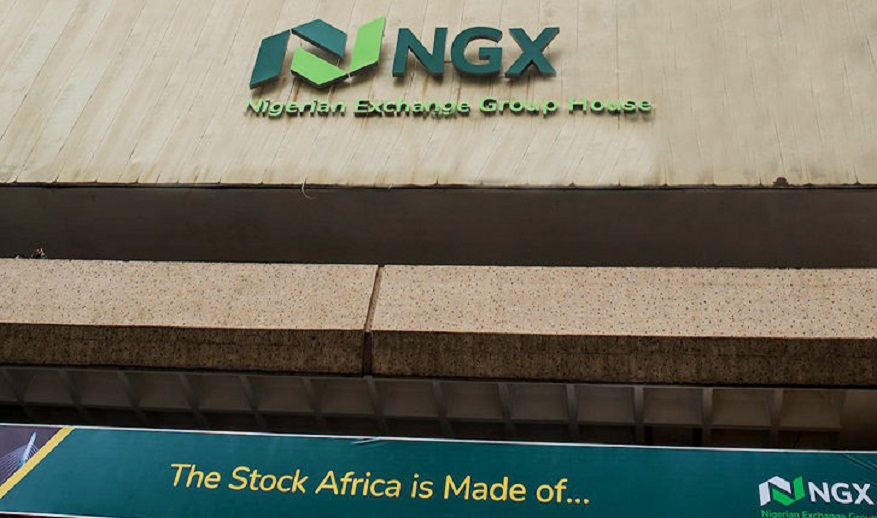
By Dipo Olowookere
The Nigerian bourse showed no signs of slowing its bull run as it further appreciated by 1.65 per cent on Tuesday, its highest daily gain in 2026.
This was influenced by continued interest in shares in the energy, consumer goods and industrial goods sectors.
Data from the Nigerian Exchange (NGX) Limited revealed that the energy space increased by 2.97 per cent, the industrial goods counter appreciated by 2.93 per cent, the banking index expanded by 1.83 per cent, the consumer goods sector improved by 0.16 per cent, and the insurance segment rose by 0.01 per cent.
As a result, the All-Share Index (ASI) added 2,863.20 points to close at 176,809.42 points compared with the previous day’s 173,946.22 points, and the market capitalisation soared by N1.838 trillion to N113.497 trillion from N111.659 trillion.
The growth recorded by Customs Street yesterday was mainly due to buying pressure on some bellwether stocks like MTN, GTCO, BUA Cement, Lafarge Africa and others.
Sixty-six equities ended on the gainers’ chart during the session, while 22 equities finished on the losers’ chart, indicating a positive market breadth index and bullish investor sentiment.
The quartet of Omatek, Deap Capital, eTranzact, and John Holt chalked up 10.00 per cent each to sell for N3.19, N8.25, N20.35, and N8.80 apiece, while Vitafoam Nigeria gained 9.98 per cent to settle at N105.80.
Conversely, Abbey Mortgage Bank lost 9.82 per cent to trade at N12.40, SAHCO declined by 9.06 per cent to N150.00, Guinea Insurance slipped by 6.67 per cent to N1.54, Consolidated Hallmark shrank by 6.64 per cent to N4.50, and Livestock Feeds depleted by 6.34 per cent to N6.65.
A total of 1.3 billion stocks valued at N50.4 billion exchanged hands in 58,965 deals on Tuesday compared with the 775.2 million stocks worth N27.9 billion transacted in 65,960 deals on Monday, implying a fall in the number of deals by 10.61 per cent, and a growth in the trading volume and value by 67.70 per cent and 80.65 per cent, respectively.
Deap Capital was the most active stock for the day with a turnover of 283.1 million units valued at N2.0 billion, Access Holdings traded 135.5 million units worth N3.2 billion, Veritas Kapital transacted 67.3 million units for N149.7 million, Tantalizers exchanged 54.7 million units valued at N289.8 million, and Zenith Bank sold 52.1 million units worth N4.0 billion.
-

 Feature/OPED6 years ago
Feature/OPED6 years agoDavos was Different this year
-
Travel/Tourism10 years ago
Lagos Seals Western Lodge Hotel In Ikorodu
-

 Showbiz3 years ago
Showbiz3 years agoEstranged Lover Releases Videos of Empress Njamah Bathing
-

 Banking8 years ago
Banking8 years agoSort Codes of GTBank Branches in Nigeria
-

 Economy3 years ago
Economy3 years agoSubsidy Removal: CNG at N130 Per Litre Cheaper Than Petrol—IPMAN
-

 Banking3 years ago
Banking3 years agoSort Codes of UBA Branches in Nigeria
-

 Banking3 years ago
Banking3 years agoFirst Bank Announces Planned Downtime
-

 Sports3 years ago
Sports3 years agoHighest Paid Nigerian Footballer – How Much Do Nigerian Footballers Earn



